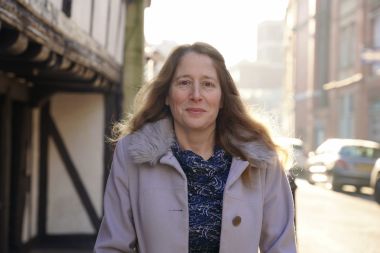Don't introduce abortion clinic buffer zones, arrested volunteer tells Scottish government

A woman arrested for praying silently near a closed abortion clinic in England has pleaded with the Scottish government not to bring in buffer zones nationwide.
Isabel Vaughan-Spruce, who was arrested and criminally charged with "intimidation" after praying silently in an abortion clinic buffer zone in Birmingham last December, raised concerns about the proposals at a Scottish government roundtable this week.
The Scottish government has expressed support for a Bill introduced by Green MSP Gillian Mackay that seeks to ban pro-life vigils and any form of "influencing" within 150 metres of abortion clinics.
The Bill as currently drafted proposes an extra 100m being available on request to extend the boundary of the buffer zone, while the Scottish government has made clear that prayer would fall within the scope of "influencing".
Ms Vaughan-Spruce warned that the Bill could lead to more people like her being arrested for offering help to vulnerable women or praying in their own heads.
She urged the Scottish government to protect freedom of expression and thought.
"It's essential that the government protect freedom of expression and of thought for the people of Scotland," she said.
"As a charitable volunteer, I strongly condemn the harassment of women in vulnerable situations. This is already illegal in Scotland – but the new proposals to install censorial zones around abortion facilities criminalise those who offer financial or practical charitable help outside abortion facilities – or, like I was doing when I was arrested – simply praying silently and imperceptibly inside our minds."
The Scottish government hosted two major summits last year bringing together supporters of the buffer zones.
Addressing the first summit in June, First Minister Nicola Sturgeon said she was committed to bringing in legislation "as a matter of urgency".
"Gatherings of this kind create additional stress for anyone using these facilities, for any purpose, and for those who work in them. But for women accessing abortion services the upset, distress and fear that they cause can be profound," she said.
"At what is already a very stressful time, women are being forced to see or make their way past these groups on the way in. And once they're inside, on top of everything else, there's the knowledge that they may have to see them again on the way out.
"In my view, the current situation is unacceptable, and it's one which we must address as a matter of urgency. I am determined that we do so.
"There are issues that we need to solve to establish buffer zones through legislation but if we work together in a spirit of solidarity, I am confident we can find a way."
The First Minister did not attend the hour-long roundtable this week. Women's Health Minister Maree Todd, who attended both summits last year, was also absent.
Back Off Scotland, a group campaigning for the buffer zones, announced over the weekend that it would be meeting with Ms Sturgeon in person in a few weeks to discuss the proposals.
ADF UK's Lois McLatchie said that the Scottish bill will lead to more arrests of pro-life volunteers.
"Nobody should be arrested simply for what they are thinking," she said.
"Unfortunately, the bill currently before the Scottish Parliament would lead to similar instances as have recently come to light in Birmingham and Bournemouth, where 'censorship zones' have led to the arrest of individuals who are simply, peacefully, praying silently in their heads.
"We stand firmly in condemnation of harassment against women in any circumstances. Fortunately, in Scotland, harassment is already illegal.
"We must be clear, then, about the real impact of the 'censorship zones' legislation as drafted in Scotland – it would go far beyond banning already-illegal harassment, and instead see it made illegal to participate in good and lawful activities, like peacefully praying, or offering leaflets about charitable help available to women who might like to consider other options."











